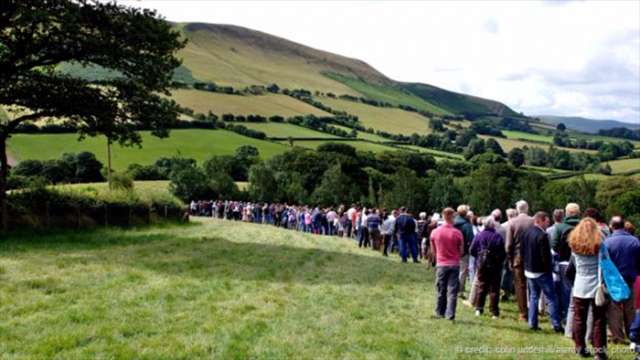Even the amid the chaos of the London riots of 2011, looters adhered to the principle of ‘first come, first serve’
Out of media player. Press enter to return or tab to continue.
Larson isn’t alone in believing the British are the best queuers in the world. The author George Mikes said that “an Englishman, even if he is alone, forms an orderly queue of one.” In his essay The English People, George Orwell wrote a foreigner would be struck by the English crowd’s “willingness to form queues.” In her book Watching the English, the author Kate Fox wrote about an intrinsic sense of fair play among the English when they queued. (And they certainly have practice at it: the average person in Britain spends one year, two weeks and one day of their life stuck in shop queues and one year and three months in traffic).
But can you really find out where someone is from based on how they queue? And why – across the world – do some queues seem to take forever, while others, even of the same waiting time, seem to go relatively quickly?
An Englishman, even if he is alone, forms an orderly queue of one – George Mikes
Larson, as well as various social scientists, believe how you queue does, in fact, often give away your origin. In the United States, how people queue even depends on which city they are from, he says. “One of my findings is that you can tell a lot about the social culture of citizens by watching their micro behaviour in queues. People in Boston, New York and Washington DC all queue in different ways,” he says. “In Washington, people queue at a random point in a sidewalk. These are government workers who know that the bus stops at this place at 4:05, and so they queue up dutifully – first come first serve. I have never seen any such behaviour in New York or Boston.”
Joe Moran, social science professor at Liverpool’s John Moores University and author of the book queuing for Beginners: The Story of Daily Life from Breakfast to Bedtime, says Britain forged its reputation at queuing during the times of shortage in the 1940s.
“The British tend to self-identify as good at queuing and there is a self-fulfilling aspect to that. But a queue is a very ephemeral thing; it is quite subjective as to whether you queue well. One person’s queue rage is another person’s normal behaviour,” he says.
No matter how “good” the queuers are, though, scientists agree that for the queue to function, it needs to be fair. As long as people are served in the order they are lined up, queue rage can be avoided.
Queues through barriers, like this one at the Dublin airport, make people happier by ensuring people will be first-come, first-served (Credit: Richard Wayman/Alamy Stock Photo)
It’s one of the three key factors that queue psychologists say must be alleviated to make those standing in line just a little bit happier: we hate getting bored, finding our wait to be longer than expected and, most of all, we really hate when someone jumps in front of us.
Boredom can be dealt with in surprisingly simple ways. Complaints over elevator delays in high-rise buildings in New York in the mid-20th Century led to mirrors being installed. All of a sudden, people could use them to check their hair, or more surreptitiously, check out those standing next to them. Complaints evaporated. If you can occupy your time, your wait will feel shorter.
The final moments of the queue are also important. Research by INSEAD business school professor Ziv Carmon and Princeton University psychology professor Daniel Kahneman found that if our wait ends on a happy note – for instance, if the queue speeds up at the end – we will view that experience more positively, even if for most of the time we were miserable, quietly cursing the person in front.
What causes long queues to begin with, meanwhile, is what is known as Poisson process arrivals.
“In a doctor’s office, some people are in and out fast while some are diagnosed with complications. So what might have been a 15-minute session might turn out to be an hour. The key thing that causes a queue is the unscheduled nature of arrivals and the uncertain duration of the length of service,” Larson says.
In London in late September, a long queue snaked outside Apple’s Regent Street store for days ahead of the launch of the new iPhone 6S. It was not a specifically British queue – the participants were from all over the world. It was, however, some seemed happier to stand in patiently.
This is the phenomenon of the non-mandatory line, an attribute of modernity.
“Routine queues bother us, but the idea of a celebratory queue doesn’t. To queue up at an Apple Store, or for tickets to a rock concert, is almost a celebratory thing – you can brag about it. They are not negative queues,” Larson says.
Another odd aspect of queuing psychology is that, sometimes, a long line turns us off. Otherwise, it encourages us to join.
“If there is a long queue, you baulk from joining it. But for a small percentage of queues when there are shortages, like cash runs in Greece, the longer the line, the more attractive it is to join,” Larson says.
Moran sees the queue as a physical expression of something that others value and as a way to ration a resource.
“In World War II, when people were queuing for fuel and food, people would join a queue without knowing what they were queuing for. They assumed if there was a queue there was something valuable at the end of it. It is a very physical expression of group psychology.
More about:
















































